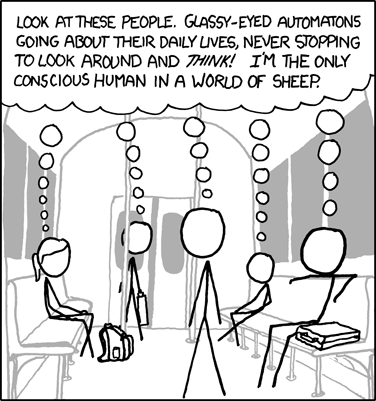For more posts in this series, see Becoming Educated Without College, Part 1, and Becoming Educated Without College, Part 2.
Free ClassesThere are several ways to get an education that doesn't require a deal with the devil. So your first born child will thank you if you skip the costly university courses and take advantage of these free resources available.
Websites like
Textbook Revolution,
Project Gutenberg, and Freeload Press offer free or cheap textbooks and textbooks from university courses that have become available in the public domain. This is a good way to catch up on your Dostoevsky or read first person accounts of the American Civil War.
Several universities also offer free online classes to the general public. Education Portal has compiled a list of
Universities with the best free online courses. And for those who tend to listen to music or audio books while completing chores, there's
iTunesU, which compiles together lectures, language lessons, and instructional videos that can be transported straight to the iPod or burned onto a CD.
If you miss the classroom setting, there are a few anarchist free schools operating in Canada and the United States, including The
Seattle Free School in Washington and
AnarchistU in Toronto. You won't earn a degree, but you can gain valuable education in a democratic, non-hierarchical collective that hosts workshops, lectures, and several arts and sciences courses.
If you want to check out a particular class at a university, many universities have sit in policies that allow guests to come in and participate in class or watch a lecture. Oftentimes the policies state you'll have to sit in the back row, or inform the teacher that you're sitting in, but most university classes, especially freshmen classes, are so big that the teacher wouldn't recognize a new face anyways.
CommunitiesBefore the Internet, you were pretty much stuck in whatever community you happened to find yourself in. You had to make friends with the boy next door even if he had a creepy bug collection, and come time for prom you had a rather incestuous dating pool to choose from. Now communities can spring up around common interests through groups like
Meetup, the fan pages on
Facebook, and various artist and writer community websites such as
DeviantART and the water cooler at
Absolute Write. If you have an interest, there's probably a community for it, full of experts more than willing to share information with others.
Most experts and writers don't become reclusive misanthropes like J.D Salinger - they tend to create community pages, message boards, and interactive websites featuring live chats and flash robot fights. I've sent emails to popular writers and received thoughtful responses in return.
ExplorationNot all the education we need to be happy, productive human beings can be learned in a classroom setting, in workshops, seminars, message-boards, or DIY videos. We are creatures who thrive on stimuli, direct experience - living vicariously through a computer screen or the pages of a book can leave us feeling hollow. While new technology has been a boon to the human race, allowing us access to information that was once sacred and allowing us communication that was once forbidden, it can also be highly addicting and isolating. Our world has become somewhat privatized, and we stay inside because that's where we're hooked up. I think of Ray Bradbury's Fahrenheit 451 where Guy Montag's wife, Mildred Montag, is completely obsessed with interactive television until her personality is almost completely eradicated.
Oftentimes I find myself surfing the internet seeking stimulus, seeking information, simply because I am bored and my mind has been trained to seek entertainment on my computer. Yet a vast arsenal of information exists outside the Internet. I used to surf the Internet for up to eight hours a day in a near hypnotic state, seeking stimulus and novelty where there wasn't any to be found because that was all I knew how to do.
The most important thing I have learned in recent years is how to turn off the computer when I am becoming bored. After a certain number of hours, I think surfing the internet makes you become over saturated with knowledge, to the point where you are browsing Wikipedia articles to figure out the exact shade of fried tilapia fish or searching news archives trying to figure whether or not Colonel Sanders was once accused of being a serial killer. (He wasn't, don't worry.)
When this happens, it's time to explore. You can learn more from wandering outside in the nighttime than following back links about a game you played back in 1997 through The Wayback Machine. To become educated, we must not only seek out academic knowledge, but sensory knowledge. As humans we crave the novelty of new experiences. And the more we read about other people's adventures, the more we want our own.
If you fear becoming a character like Ray Bradbury's Mildred Montag, sitting at home having fake adventures with people on the television, then think of Clarisse Mclellan, the girl Guy Montag meets in the streets who is "sixteen and crazy" who is strange and full of life, who stops to watch things even as everyone else is speeding up.
So leave the computer. Fight perpetual boredom and lack of stimulus. Go outside. Go to the park. Roll in the grass and count the stars. Go backpacking across the country. Visit a commune or an old friend across the country. Attend meetings with revolutionaries. Go to parties you weren't invited to. Fall in love half a dozen times a day. Get into conversations with strangers. Put on your boots and go creek hiking. Build a boat and see how far you can row away from shore. Become educated because of your direct contact with the world, and continue to learn in the moments that books and classes cannot fill.

Becoming Educated Without College, Part 3



